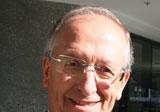World drug problem 'contained': UN official
The Executive Director of the United Nations Office on Drugs and Crime (UNODC), Mr Antonio-Maria Costa, has given an address at UNSW, suggesting that the world drug problem is being contained.
The Executive Director of the United Nations Office on Drugs and Crime (UNODC), Mr Antonio-Maria Costa, has given an address at UNSW, suggesting that the world drug problem is being contained.

The Executive Director of the United Nations Office on Drugs and Crime (UNODC), Mr Antonio-Maria Costa, has given an address at UNSW, suggesting that the world drug problem is being contained.
In his presentation, Something new on the world drug scene, Mr Costa quoted UN research which found that world-wide there is relative stability in the four illicit drug groups of cocaine, synthetic drugs, cannabis and opium.
Mr Costa also reflected on Australia's experience with drug control.
The UN research he quoted showed Australia's drug peak was during 1998, when 22 percent of Australians took some sort of illicit drug at least once during that year.
Mr Costa praised the Federal Government's 'balanced' approach on drugs, suggesting it has lead to marked reductions of drug use in Australia. Heroin showed the most dramatic results with usage falling by 75 percent.
Mr Costa warned that while there have been improvements, Australia could not afford to rest on its laurels. He said of the 193 countries considered in the report, it was still in the top ten in terms of usage.
A long-term approach, including bipartisan support, education and positive media exposure are needed to tackle the problem, he said.
The UNODC is a global leader in the fight against illicit drugs and international crime. Established in 1997, the office is mandated to assist Member States in their efforts against illicit drugs, crime, terrorism and people smuggling. The UNODC does this through three primary activities: research and analysis, lobbying governments to adopt various crime and drug-based laws and treaties, and provision of technical assistance to governments at the working level.
Mr Costa is also the Under-Secretary-General of the United Nations and Director-General of the United Nations Office in Vienna.
Mr Akira Fujino, UN Representative Regional Centre for East Asia & the Pacific and the Dean of Medicine, Professor Peter Smith, were amongst the distinguished guests at the event.